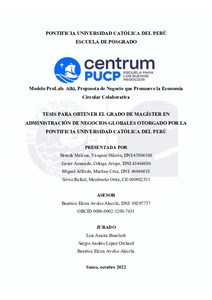| dc.contributor.advisor | Avolio Alecchi, Beatrice Elcira | |
| dc.contributor.author | Vásquez Hilario, Brenda Melissa | |
| dc.contributor.author | Odiaga Arispe, Javier Armando | |
| dc.contributor.author | Martino Cruz, Miguel Alfredo | |
| dc.contributor.author | Membreño Ortiz, Silvio Rafael | |
| dc.date.accessioned | 2022-11-14T16:49:09Z | |
| dc.date.available | 2022-11-14T16:49:09Z | |
| dc.date.created | 2022 | |
| dc.date.issued | 2022-11-14 | |
| dc.identifier.uri | http://hdl.handle.net/20.500.12404/23776 | |
| dc.description.abstract | El presente documento presenta una solución innovadora, para un mercado donde existe
un consumismo desmedido, tomando como ventaja la reciente adopción de los consumidores
hacia iniciativas de colaboración social y el crecimiento del comercio electrónico que se originó
por la pandemia causada por el virus SARS-COV-2 (Covid-19). Gracias a la aplicación de
metodologías ágiles, se pudo identificar usuarios que deseaban realizar alguna actividad
específica, sin embargo, no cuentan con el producto que necesitan para dicha actividad y no
están dispuestos a comprarlos debido a que es una necesidad puntual; mientras que, por otro
lado, identificamos usuarios que tienen productos en desuso con riesgo a deteriorarse sin obtener
ningún beneficio. La solución que se plantea es Alki, una plataforma digital que permitirán
conectar a estos dos usuarios. Después de definir el mercado objetivo como personas de Lima
metropolitana de nivel socioeconómico A/B y C en un rango de edad de 25 a 55 años se logró
identificar las principales oportunidades para llegar a la solución propuesta.
Dicha propuesta está respaldada por una investigación de mercado, diseño de prototipos y
un plan operativo que sustentan la deseabilidad y la factibilidad de la solución. Respecto a la
viabilidad económica, se proyecta un crecimiento anual del 5% y el valor presente neto (VAN)
del proyecto a cinco años es de S/ 2,048,781, lo cual sustenta la viabilidad financiera de la
solución. En cuanto al aspecto social, la solución planteada impacta directamente en tres
objetivos de desarrollo sostenible (ODS) y cuenta con un VAN Social de S/3,354,765, logrando
mitigar la contaminación de los suelos reduciendo un aproximado de 5,700 toneladas de
desperdicios anuales que llega a los vertederos. Finalmente, se recomienda la implementación
del proyecto en el mercado local y se sugiere una innovación continua para que sea escalable a
nivel nacional e internacional. | es_ES |
| dc.description.abstract | This document presents an innovative solution for a market with hyper-consumerism,
taking advantage of the recent adoption of consumers for social collaboration initiatives and the
growth of e-commerce originated by the pandemic caused by the SARS-COV-2 virus (Covid 19). Thanks to the application of agile methodologies, it was possible to identify users who
wanted to carry out a specific activity; however, they do not have the required articles to perform
it and they are not willing to buy them because they are for a specific need. On the other hand,
there are users who have idle items at risk of deterioration without obtaining any benefit from
them. The proposed solution is Alki, a digital platform that will allow these two users to connect.
The main opportunities to achieve the proposed solution were identified by defining the target
market as people from the metropolitan city of Lima with socioeconomic level A/B and C,
within an age range of 25 to 55 years.
This proposal is supported by market research, prototypes design and an operational plan
that supports the desirability and feasibility of the project. Regarding the economic viability, an
annual growth of 5% is expected and the net present value (NPV) of the project in five years is
S/ 2,048,781, which provides financial support to the solution. In terms of the social aspect, the
proposed solution has a direct impact on three Sustainable Development Goals (SDGs) and has a
social net present value (NPV) of S/3,354,765, mitigating soil contamination by reducing
approximately 5,700 tons of waste per year from landfills. Finally, project implementation in the
local market is recommended and continuous innovation is suggested to scale in a national and
international level. | es_ES |
| dc.language.iso | spa | es_ES |
| dc.publisher | Pontificia Universidad Católica del Perú | es_ES |
| dc.rights | info:eu-repo/semantics/openAccess | es_ES |
| dc.rights | Atribución-NoComercial-SinDerivadas 2.5 Perú | * |
| dc.rights.uri | http://creativecommons.org/licenses/by-nc-nd/2.5/pe/ | * |
| dc.subject | COVID-19 (Enfermedad) | es_ES |
| dc.subject | Negocios--Planificación | es_ES |
| dc.subject | Innovaciones tecnológicas | es_ES |
| dc.subject | Servicios digitales | es_ES |
| dc.title | Modelo prolab: Alki, propuesta de negocio que promueve la economía circular colaborativa | es_ES |
| dc.type | info:eu-repo/semantics/masterThesis | es_ES |
| thesis.degree.name | Magíster en Administración de Negocios Globales | es_ES |
| thesis.degree.level | Maestría | es_ES |
| thesis.degree.grantor | Pontificia Universidad Católica del Perú. CENTRUM | es_ES |
| thesis.degree.discipline | Administración de Negocios Globales | es_ES |
| renati.advisor.dni | 09297737 | |
| renati.advisor.orcid | https://orcid.org/0000-0002-1200-7651 | es_ES |
| renati.author.cext | 000982531 | |
| renati.author.dni | 45804360 | |
| renati.author.dni | 43464886 | |
| renati.author.dni | 46046018 | |
| renati.discipline | 413227 | es_ES |
| renati.juror | Lisa Annita Bunclark | es_ES |
| renati.juror | Sergio Andres Lopez Orchard | es_ES |
| renati.juror | Beatrice Elcira Avolio Alecchi | es_ES |
| renati.level | https://purl.org/pe-repo/renati/level#maestro | es_ES |
| renati.type | https://purl.org/pe-repo/renati/type#tesis | es_ES |
| dc.publisher.country | PE | es_ES |
| dc.subject.ocde | https://purl.org/pe-repo/ocde/ford#5.02.04 | es_ES |






